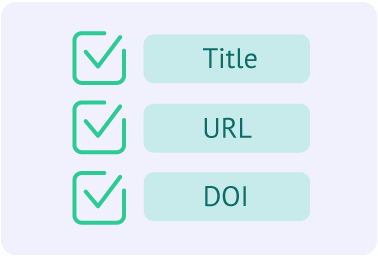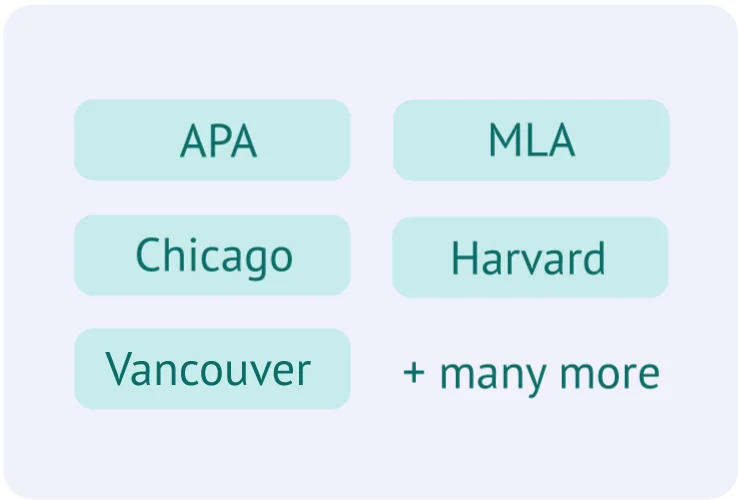Free Vancouver Citation Generator by AHelp
Explore the Central Aspects of the Vancouver Style Citation Maker

Proper Reference Formatting
Do not miss any commas, colons, or semi-colons when organizing your reference list. Free Vancouver Citation Generator by AHelp will follow all the requirements for this reference style and include all the needed information.
Cite Various Sources
Need to cite a website, journal, book, or online report? No worries, AHelp’s Vancouver Citation Generator will organize all these references for you.
Include Approved Abbreviations
With AHelp’s Vancouver Citation Generator, you won’t have to worry about looking up all the necessary abbreviations to include in your reference. Provide the DOI or URL of the needed source and the Generator will find everything for you.AHelp Vancouver Citation Generator Streamlines Scientific Documentation

What is Vancouver Cite Style
Vancouver Referencing Style is also widely referred to as ICMJE or Uniform Requirements Style. This type of formatting is largely used for academic papers written in the health and biomedical sciences.
It was mostly created for research papers’ submission to the Biomedical Journals and works the same as the National Library of Medicine Recommended Formats for Bibliographic Citation.
How to Cite Sources in Vancouver Format: General Guidelines
Vancouver Ref style, in contrast to most other formatting styles, utilizes the citation-sequence system. This means that the references included at the end of your paper should be listed in the same order they appear in the text, and not alphabetically.
How to use Vancouver Citation Generator by AHelp
If you are not sure how to properly cite sources using the Vancouver citation style, the Vancouver Citation Generator by AHelp can be of help. With this tool, you will be able to create the necessary reference that aligns with all the style guidelines just in a few seconds.
You can use our Vancouver Citation Generator in two modes: manual, in case you have all the necessary information about the source and just need to organize it properly; or automatic, where you just have to enter the URL or DOI (digital object identifier) of the source and our generator finds the necessary details for you.
To use Vancouver Citation Generator by AHelp just enter the details you have in the specified field and click the ‘generate’ button. Voila – just in seconds you have a few versions of the properly structured reference for your paper.
Creating a Reference list with Citation Machine Vancouver
The reference list is a list of sources you used when writing your academic paper. It appears on a separate page at the end of your research paper, titled “References,” centered at the top of the page.
All the references are listed according to the order in which they appear in the text. Titles of sources do not require italics, underlining, or quotation marks. As to the general rules, they may differ depending on the source you need to cite.
For journal articles in print, the basic format is:
- Author Surname Initials.
- Title of article.
- Abbreviated Title of Journal.
- Date of Publication;
- Volume Number(Issue Number): Page Numbers.
For online articles, the format expands to include the type of medium and access information:
- Author Surname Initials.
- Title of article.
- Abbreviated Title of Journal [Internet].
- Date of Publication [cited Date of Access];
- Volume Number(Issue Number): Page Numbers.
- Available from: URL or Database Name.
For all journal titles, the agreed abbreviations must be used, which can be found on the National Library of Medicine’s (US) PubMed website within their NLM catalog: Journals referenced in the NCBI database.
For books, the format varies slightly between print and online versions as well.
For print:
- Author/Editor Surname Initials.
- Title: subtitle.
- Edition (if not first).
- Place of publication: Publisher;
- Year.
- Length.
For online books, the format includes [Internet] and access details:
- Author/Editor Surname Initials.
- Title: subtitle. Edition (if not first) [Internet].
- Place of publication: Publisher; Year.
- [cited Date of Access].
- Length.
- Available from: URL or Database Name.
How to Format Vancouver in Text Citation
General rules. In the Vancouver reference style, when citing sources within the text of your paper use Arabic numerals in round () or square [] brackets. Some journals may require to list in-text citations in superscript numbers. If you reference a source for the first time, you would use [1]. If this source is cited again later, the same number is reused.
It’s important to note that the source you use appears only once in the reference list, regardless of how many times or how many specific pages you cite in the text.
Multiple Sources. When citing multiple sources simultaneously, list their numbers separated by commas for non-consecutive sources (e.g., [1,4]) or a dash for consecutive sources (e.g., [1–3]). The in-text citations must be included:
– outside periods and commas – e.g.: As studying methodology shows,(2) it is acceptable to use the said testing methods in case of such research. (4)
– inside colons and semi-colons – e.g.: We need to consider the influence of the following criteria (5):…
Specific Pages. When citing specific pages, quotations, or charts within a single source at various points in your text, follow this example: Recent studies have shown that early intervention in cases of stroke can significantly improve recovery rates. [2, p89]
Titles and Names. It’s generally unnecessary to mention the author’s name or the source’s title in the text, except in specific situations where it adds value. In these cases, you should include a name and a reference number in brackets: Webber (6) mentions…
Indirect Citation. The use of ideas that have been referenced by other authors is generally not welcomed in Vancouver formatting style. So, if your source number 5 references Schmidt, you need to find the work of Schmidt and cite it directly. If it’s impossible to find the original work, use the indirect citation with the name and year of that first source.
